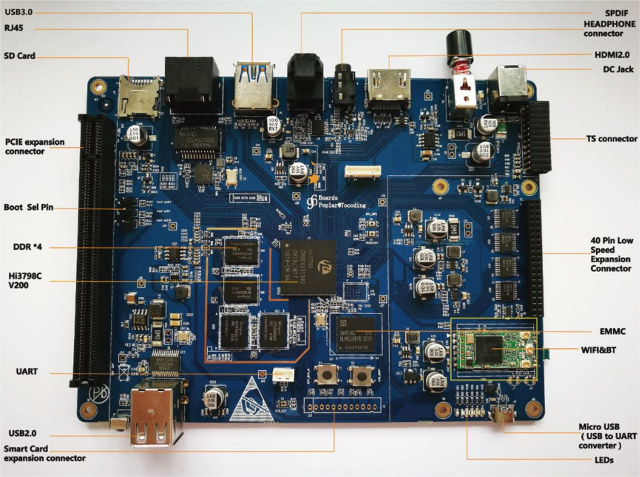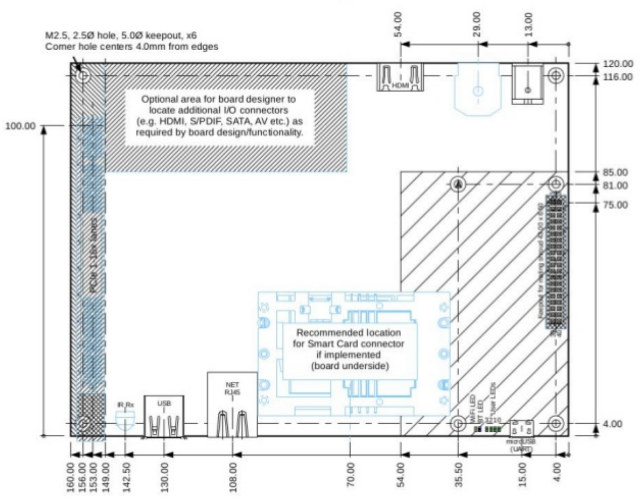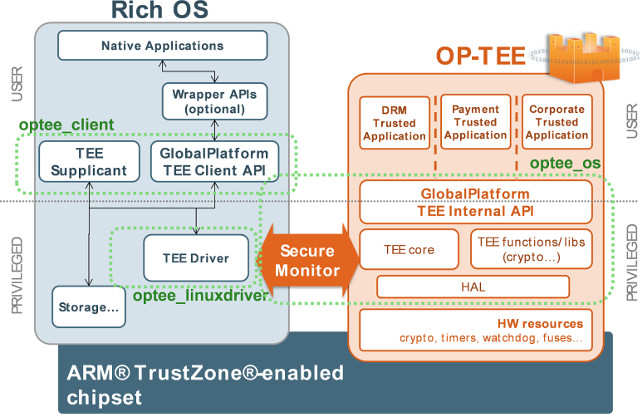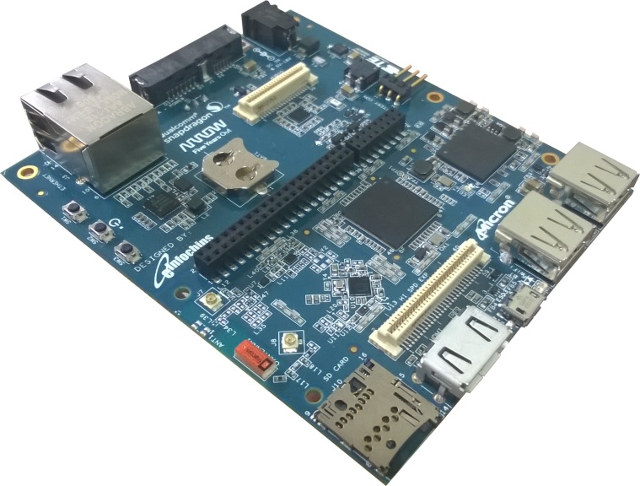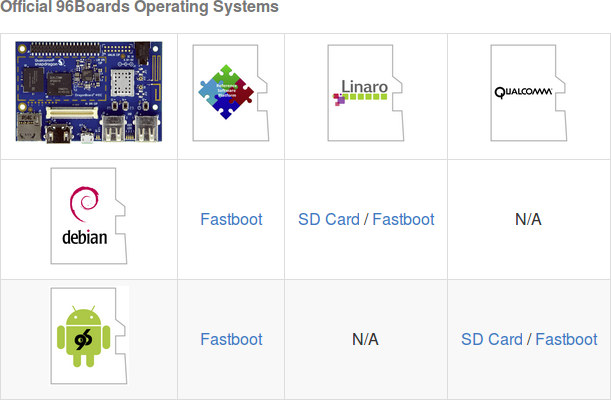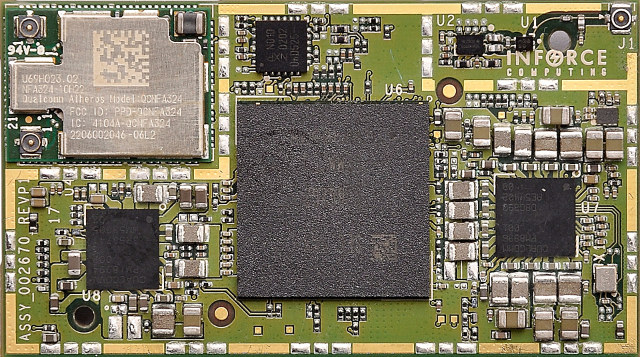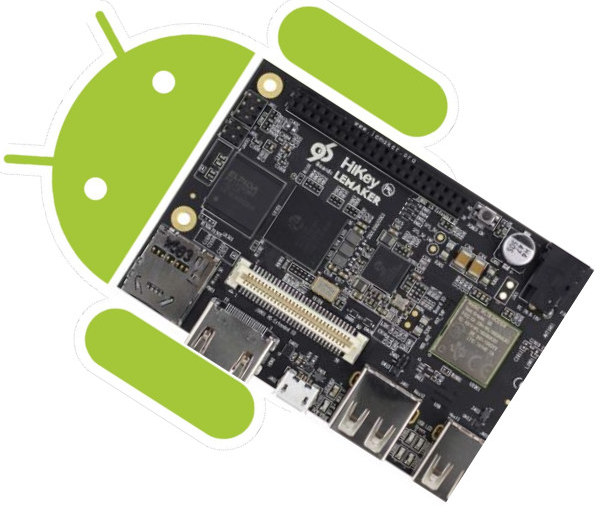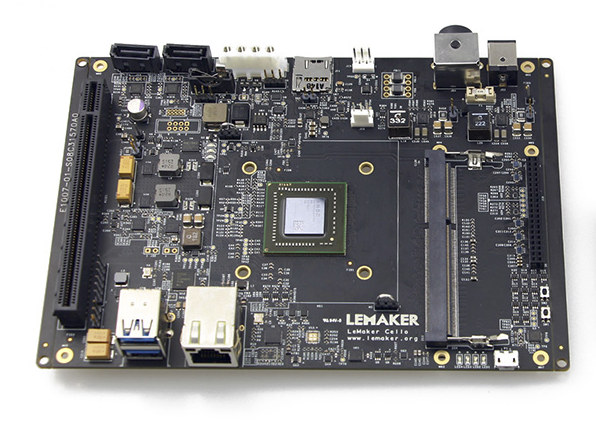At the end of last month I wrote about 96Boards TV Platform specifications, and noticed Hisilicon had one such boards, but details were sparse. Linaro has now officially unveiled HiSilicon Poplar board, the first 96Boards TV Platform board, sold for $79 + shipping on Aliexpress. Poplar board specifications: SoC – HiSilicon Hi3798C V200 quad-core 64-bit ARM Cortex-A53 CPU up to 2.0 GHz per core with ARM Mali-T720 GPU supporting OpenGL ES 3.1/3.0/2.0/1.1/1.0, OpenVG 1.1, OpenCL 1.2/1.1 Full Profile, RenderScript, and Microsoft DirectX 11 FL9_3 Memory – 1 or 2 GB DDR3 (Specs are conflicting depending where you look) Storage – 8GB eMMC flash + micro SD card slot Video Output – HDMI 2.0a with HDCP 2.2 up to 4K @ 60Hz Video Decoding – H.265/HEVC Main/Main10 and VP9 up to 4K @ 60 fps Audio Output – HDMI, optical S/PDIF, 3.5mm audio jack Connectivity – Gigabit Ethernet, 802.11 b/g/n/ac WiFi […]
96Boards Gets a TV Platform Edition Targeting $50 Mid-range Boards, $99 High-end Boards
96Boards was born as a hardware and software standard with Consumer (CE) & Enterprise Editions (EE), with different form factors with the latter focusing on server boards, but with similar software requirements requiring recent and mostly open source software. The consumer edition was also split into “Standard” and “Extended” editions, which the latter allowing for larger boards with more features, while the Enterprise Edition has its own larger format, as well as an option for micro-ATX form factor. I’ve just learned that a “fifth” 96Boards standard has been worked on with 96Board TV Platform for Home Gateways, OTT Streaming boxes, and TV boards with prices target of $50 or lower for mid-range boards, and $99 or lower for high-end boards. 96Boards TV Platform hardware requirements: Dimensions – 160 x 120 mm (EE Standard form factor) RAM – 1GB minimum; 2GB recommended Flash – 8GB eMMC minimum WiFi – 802.11 g/n […]
Raspberry Pi 3 To Get ARM TrustZone Support with Linaro OP-TEE Port
If you ever wanted to experiment with ARM Trustzone, and IoT security, you’ll soon be able to do so with the Raspberry Pi 3 board thanks to a port of Linaro OP-TEE (Open Portable Trusted Environment Execution) by Sequitur Labs. Broadcom BCM2737 SoC found in Raspberry Pi 3 board already had TrustZone hardware for isolation and protection for sensitive material such as cryptographic keys, algorithms and data, but the upcoming software release will mean the feature can now be used, and it’s free for trial/evaluation, and education. Trustzone is also used for DRM (digital rights management), but in the case of Raspberry Pi 3 it will most likely used to teach how to secure the Internet of Things (IoT). The release is scheduled for July 11, with source code and documentation to be available in OP-TEE github account. All you’ll need to get started is a Raspberry Pi 3 board, […]
SD 600eval Development Board Compliant with 96Boards CE Extended To Sell for $279
Last month, we found out that Arrows Electronics was working on DragonBoard 600c development board featuring Qualcomm Snapragon 600 processor and based on 96Boards CE Extended version which allows for extra features such as SATA and Ethernet ports. At the time, the complete specifications were not available, and neither pricing. We do now have more details, as the board designed by Elinfochips is (also) called SD 600eval, and is available on back order for $279. SD 600eval specifications: SoC- Qualcomm Snapdragon 600 (APQ8064) quad-core Krait 300 processor @ up to 1.7 GHz with Adreno 320 GPU @ 400MHz supporting OpenGL ES 1.1/2.0, OpenCL 1.1, WebGL 1.0, and DirectX 9.3 System Memory – 2GB PoP LPDDR2 @ 533 MHz Storage – 16GB eMMC Flash + micro SD 3.0 (UHS-1) slot + SATA port Video Output – HDMI up to 1080p Video – 1080p@30fps HD video playback and capture (h.264/AVC) Connectivity – […]
Debian on DragonBoard 410c Development Board
I purchased Qualcomm DragonBoard 410c development board last year, and first tested it and run some benchmark on the 96Boards compliant hardware with Android. I found that it was still work-in-progress, and decided to wait before trying Debian on the board. I’ve now done so, and will report by experience installing Debian Linux, playing with the board, and running Phoronix benchmarks to compare it to other ARM Linux boards. Installing Debian on DragonBoard 410c The first challenge is to navigate through the documentation that is not always clear or up-to-date. I eventually ended up on DragonBoard 410c Wiki on Github. You then have to decided which image you want. While there are two official operating systems with Android and Debian, you can three “entities” releasiong their own images. For Debian specifically, you have the Linaro image, and Reference Platform Build (RPB) image. I could not find any changelog or known […]
Inforce 6601 micro SoM Snapdragon 820 System-on-Module Embeds WiFi, Bluetooth and GPS
We’ve already seem Intrinsyc’s Snapdragon 820 development board and module, but there’s now an alternative thanks to Inforce Computing 6601 micro SoM which is pin-to-pin compatible to the company’s earlier Inforce 6401 and Inforce 6501 Micro SOMs, also based on Qualcomm Snapdragon processors, and works with the same SYS6501 carrier board. Inforce Computing 6601 Micro SoM specifications: SoC – Qualcomm Snapdragon 820 (APQ8096) quad core ARMv8 processor with two “Gold” cores up to 2.2 GHz, two “Silver” cores up to 1.6 GHz, Adreno 530 GPU with support for OpenGL ES 3.2, OpenCL 2.0, and Vulkan, as well as Hexagon 680 DSP up to 825 MHz System Memory – 4GB LPDDR4 @ 1866 MHz Storage – 64GB UFS 2.0 gear 3 flash up to 5.83Gbps, 1x micro SD card 3.0 interface for support for to HS400, optional eMMC 5.1 flash. Connectivity – Bluetooth 4.1 & 2×2 dual band 802.11 b/g/n/ac Wi-Fi […]
96Boards Hikey Development Board is Now Officially Supported in AOSP
Hikey is a one of the first 96Boards compliant development board manufactured by either LeMaker in China and CircuitCo in the US, and while the hardware requirements of 96Boards specifications are rather easy to meet, the software requirements including “bootloader (open source), accelerated graphics support (binary or open source), a Linux kernel buildable from source code based from mainline, or the latest Google-supported Android kernel version” are much harder to comply with. Linaro had a very good news for Linaro Connect Bangkok as they announced Hikey board was supported in Android Open Source Project (AOSP). So that means Hikey board will run the latest version of Android like Google Nexus devices, with the advantage of also getting more recent devices. If you want to build an Android image from AOSP just retrieve the source code:
|
1 2 |
repo init -u https://android.googlesource.com/platform/manifest repo sync -j8 |
Grab & extract vendors binaries for Hikey from Google.com. and complete the build:
|
1 2 3 |
source build/envsetup.sh lunch hikey-userdebug make -j8 droidcore |
[…]
LeMaker Cello 96Boards EE Board Powered by AMD Opteron A1120 Processor Targets Server Applications
There are two versions of Linaro’s 96Boards specifications the Consumer Edition (CE) and the Enterprise Edition (EE) with higher hardware requirements, and while several boards mostly compliant with 96Boards CE are available such as DragonBoard 410c and Hikey boards, the only board announced to be compliant with 96Boards EE specifications was AMD Huskyboard based on Opteron A1100 series processor and is yet to be available for sale. LeMaker has now designed a similar EE boards called Cello. LeMaker Cello board specifications: Processor – AMD Opteron A1120 quad core Cortex A57 processor @ 1.7 GHz with 2MB L2 cache, 8MB L3 cache System Memory – 2x DDR3 SO-DIMM sockets Storage – 2x SATA 3.0 ports, micro SD slot Connectivity – 1x Gigabit Ethernet RJ45 port USB – 2x USB 3.0 ports Expansions x16 PCIe G3 slot 40-pin Low Speed (LE) expansion header Debugging – micro USB port for console access, 10-pin […]


